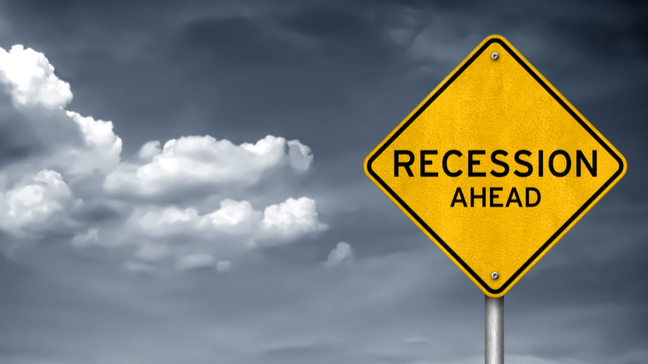Let’s be formal: According to the National Bureau of Economic Research, a recession is a significant economy-wide decline in economic activity lasting more than a few months, usually reflected in real GDP, real income, employment, industrial production, and wholesale trade. -retail.
Another common definition of a recession is when the economy contracts for two consecutive quarters. This “shrinkage” comes in the form of negative GDP (or gross domestic product) growth.
Regardless of how you understand it, a recession is a negative economic phenomenon that often leads to financial problems for many of us.
What is the difference between recession and depression?
Like the common cold, recessions can be mild, severe, or somewhere in between. While recessions are not good, they don’t always have to be catastrophic for the economy. In fact, many experts predict that if the US enters a recession soon (if not already), it will be milder than previous major recessions the country has experienced.
Unlike a recession, there is no standard economic definition for depression. The only real frame of reference we have for depression is the Great Depression that followed the stock market crash of 1929. This period was marked by deep and persistent job losses, poverty and hopelessness. It lasted about 10 years compared to the 2008 financial crisis recession which lasted 18 months.
What causes a recession?
Source: makeameme.org
Our economy is made up of people, businesses and governments that spend money. Whenever one of these groups spends money on something, that money goes into someone else’s pocket. This circular movement of money and how much money can be spent is at the heart of how the economy works.
In the US, about 70% of economic activity is driven by so-called “consumer spending,” that is, how much people spend on goods and services.
This willingness to spend and the availability of money change over time due to many macro factors creating the business cycle.
Consumer negativity and psychology
Not surprisingly, the better you feel about your future financial prospects, the more likely you are to spend money on those sneakers or a new iPhone in the next 12 months. This is consumer sentiment or confidence. It is a leading economic indicator that can predict how much consumers are willing to spend and, as a result, predict the coming recession.
But because there are so many things that can affect our collective willingness to spend (and our feelings about the future), a drop in consumer confidence/mood doesn’t always lead to a recession.

Source: Conference Board.
Rising interest rates
Interest rates are a key factor in overall financial conditions.
When times get tough, financial institutions tend to lower things like interest rates and lending standards to increase the availability of money (credit) and the ability of consumers and businesses to spend it. Armed with more money and lower tariffs, consumers are motivated to spend money on goods and services while businesses spend on hiring or other investments. It is an environment created in 2020 by the Federal Reserve and the US government.
But when the economy picks up again and gets too hot, those same institutions raise interest rates and tighten lending standards, making money more expensive and less available. This reduction in the availability of money and the higher cost of existing debt reduces the ability of consumers and businesses to spend money.
As spending slows, so does the economy. A common reason for raising interest rates is that the strength of the economy creates too much inflation. This is exactly what is happening right now as the world struggles with high inflation caused by the pandemic.
By itself, raising interest rates does not always lead to a recession, but it has a serious impact on consumers, investors and the economy.
Read more: Understanding the Yield Curve: The Most Important Market Indicator You’ve Never Heard Of
Blowing up the asset bubble
Asset bubbles occur when the market prices of various types of investments rise to levels where they are trading much higher than they are worth.
These bubbles tend to arise from a combination of investor psychology, low interest rates, and temporary imbalances in supply and demand.
Read more: Economic Bubbles: What They Are, Why They Happen, and Why You Should Care
There are many well-documented cases in economic history when a bursting asset bubble is followed by a recession. The collapse of the housing market in 2008 and related financial assets pushed the US into one of the deepest recessions on record.
Deflating asset bubbles are driven by many factors, and when they occur, access to credit and consumer/investor optimism tends to dwindle, resulting in reduced consumer and business spending and job losses.
All these factors together lead to a recession.

Source: imgur.com
deflation
Inflation can lead to a recession, but so can deflation. Deflation occurs when the prices of goods and services decline, causing consumers to delay purchases in anticipation of further price declines. This leads to negative inflation.

Source: Giphy.com
Deflation causes a feedback loop where both consumers and businesses stop spending, resulting in job losses, wage cuts, and a slowing economy. A weak economy could fuel fears of deflation, which in turn could lead to a further fall in the economic spiral.
To beat deflation, central banks are cutting interest rates to stimulate spending and governments are taking action to increase discretionary purchasing power.
Many countries have experienced deflation over the years, but a modern example of deflation has been Japan’s struggle with it since the mid-1990s.
How to Prepare for a Recession
While it’s impossible to predict when we’ll hit a recession, there are a few things you can do to prepare.
Get educated and don’t panic
The more you know about what recessions are, how they work, and how long they last, the better prepared you will be psychologically to deal with them. Although they are scary, keep in mind that since 1945 recessions have lasted an average of 11 months and resulted in a 2.4% drop in GDP.
These averages are much less severe than the 5.10% contraction in GDP that occurred during the 2008 financial crisis and the 19.2% contraction that occurred at the height of the 2020 pandemic.
In fact, most recessions that have occurred since 1945 have resulted in contractions between 0.30% and 3.70%. So whenever there is talk of a recession, don’t panic. Since you can only control a limited number of things, it’s best to first focus on what you can control and remind yourself that this too shall pass.

Source: Ben Carlson, The Richness of Common Sense.
save more
Since recessions are usually accompanied by job losses, it would be a good idea to start building additional reserves in your emergency fund in case your job is at risk.
When the economy collapses, sales, marketing, product management, and recruitment jobs can be hit the hardest, especially if they are related to a company’s non-core business.
Common sense dictates that you should set up a reserve fund for three to six months, depending on the type of work you do. But increasing that amount to 8-11 months can give you more financial cushion and more peace of mind.
Use our Emergency Fund Calculator to determine how much you should have in yours.
Start a part-time job
The most frustrating thing about 9-5 is that your main source of income depends on one organization. During an economic downturn, that income can evaporate, leaving you to fend for yourself.
With such job volatility these days, starting a part-time job can be one of the best ways to reduce your dependency on a 9-to-5 employer. Think of it like an insurance policy.
There are many ways to start a side job; you just need to think creatively and get started.
Read more: Side Job Ideas: 35+ Ways to Make More Money on the Side
Reduce debt
Having too much debt during a recession can be the fastest way to create real financial trouble for yourself. When times get tough, debt can either provide you with a lifeline to overcome temporary deficits, or it can kill you if you have to pay high-interest obligations.
The best way to mitigate these risks is to keep outstanding debt levels low during good times, make debt repayment a priority when you have money to spare, and avoid credit card debt.
Read more: How to pay off credit card debt quickly
bottom line
No matter how scary recessions are, remember that while they are inevitable, they do not last forever and are not always deep or long lasting. As an individual, there is very little you can do before and during one, so focus on the things you can control.
The best thing to do is to always watch for the signs of a recession and make sure you’re in the best position to get through it – before they happen. Unfortunately, recessions are a feature, not a bug, in the way the economy works.
Featured Image: gguy/Shutterstock.com


